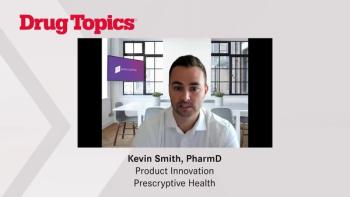
New SureScript CEO sees e-Rx relief coming to R.Ph.s
David Weinstein, new CEO of SureScript, outlines the firm's plans for electronic connectivity between physicians and pharmacists.
TECHNOLOGY
New SureScript CEO sees e-Rx relief coming to R.Ph.s
Pharmacists and technicians being driven beyond the point of distraction by telephone tag with doctors' offices should take heart; SureScript is on the way, according to the new CEO of community pharmacy's electronic connectivity venture.
Taking the typical roadblocks out of contact between physicians and pharmacists when it comes to prescription renewal authorizations is SureScript's first target, according to David Weinstein, Ph.D., M.B.A. A cofounder of the electronic prescribing firm e-Script back in 1994, he was named in January to head the joint venture of the National Association of Chain Drug Stores and the National Community Pharmacists Association.
"Prescription renewal is the highest pain point for prescribers and pharmacists," Weinstein told Drug Topics. "Our goal is to make that transaction automated. When the patient calls up the pharmacy for a refill but there are no refills left, the pharmacy has to call or fax the doctor under the current paradigm. With SureScript, as the renewal request gets entered into the pharmacy system, it goes right to the SureScript network, which delivers it to the prescriber's mailbox. The doctor can review the request, and it goes back to the pharmacy system for review and filling, if authorized."
High on SureScript's to-do list is a shakedown cruise for the technology in the form of a pilot study. Weinstein said no launch date for the study has been set. However, the Arlington, Va., firm has not yet chosen a strategic partner to construct its electronic gateway.
SureScript will be an electronic bridge between the e-prescribing systems used by prescribers and pharmacies. It will be designed to run on many different systems, such as handhelds, cell phones, or the Web, and use transaction standards developed by the National Council for Prescription Drug Programs. Pharmacies will not have to invest in new hardware or software if their vendors integrate SureScript's services through NCPDP's standards.
"I like to think that we are vendor agnostic in the sense that whoever the doctor chooses will be able to use our implementation guide and program to hook up our service," Weinstein said. "We want to reach out to offer as much flexibility to prescribers and pharmacists as possible in terms of how they access the system."
SureScript's financial model is based on charging a fee per transaction, but exactly who and how much to charge have not been finalized. Weinstein believes that chains and independents realize the cost-benefit ratio is favorable. "They're saying there are two issues," he said. "First, they pay a pharmacist so much per hour. If it means she or he is not on the phone with the doctor's office for five minutes, what's that worth? Right there is a net win. And then they say the supply of pharmacists is constrained, so who the heck is going to fill that coming tidal wave of scripts unless we do things more efficiently? We serve both those drivers quite well."
Despite what some in pharmacy may think, Weinstein said that SureScript is not community pharmacy's answer to RxHub, the electronic connectivity venture announced a year ago by pharmacy benefit managers AdvancePCS, Express Scripts, and Merck-Medco Managed Care. He added, "Clearly, the formation of RxHub accelerated the formation of SureScript, but I believe that the notion and formation of SureScript was already in process."
While the two ventures will operate in the electronic connectivity arena, RxHub and SureScript really won't be direct competitors, Weinstein said. Pharmacists will use SureScript to communicate with prescribers, and if they participate, they will use RxHub to submit Rx claims for adjudication.
"The pharmacy will still have adjudication as a separate operation," Weinstein said. "SureScript is primarily responsible for delivering authorization to the pharmacy, then the pharmacy continues its existing relationship with the PBMs for things such as claims adjudication. Some issues are best resolved between the pharmacy and the PBM. That's not part of our mission."
SureScript is not going to become just another footnote in the history of failed attempts to forge electronic links between physicians and R.Ph.s, according to Weinstein. Two factors raise the odds of success: community pharmacy is united behind it and physicians are ready to sign on.
"Past efforts were always approached in a fragmented fashion," Weinstein said. "You'd talk to Chain A or Independent B. This time chains and independents are united to make this happen under the umbrella of NACDS and NPCA. That's the critical mass, the value proposition that's really going to make the difference. And when we talk to physicians in focus groups, their response is 'When can we have it?' "
Carol Ukens
Carol Ukens. New SureScript CEO sees e-Rx relief coming to R.Ph.s.
Drug Topics
2002;3:60.
Newsletter
Pharmacy practice is always changing. Stay ahead of the curve with the Drug Topics newsletter and get the latest drug information, industry trends, and patient care tips.























